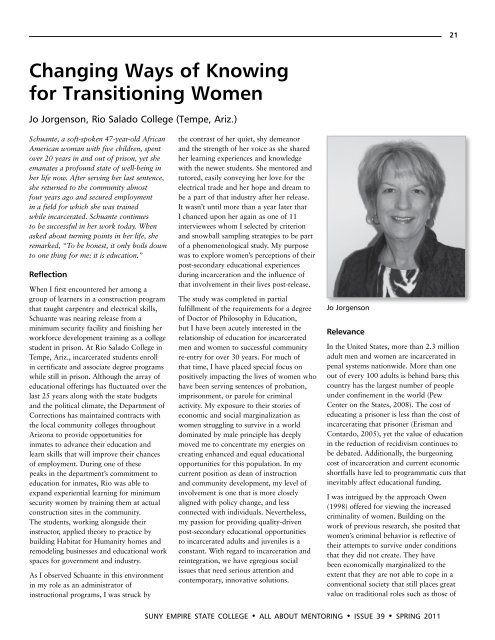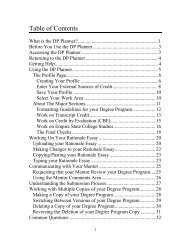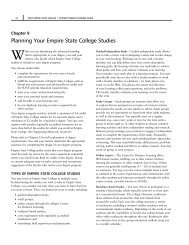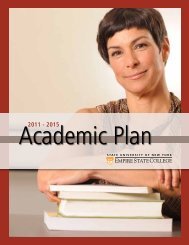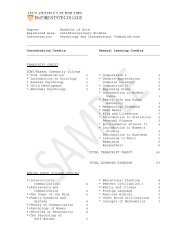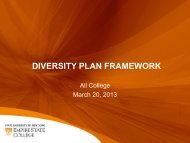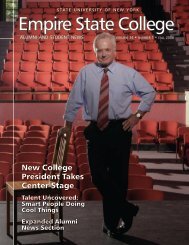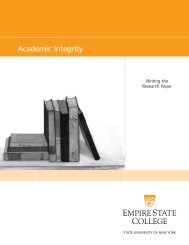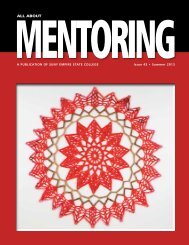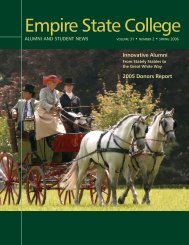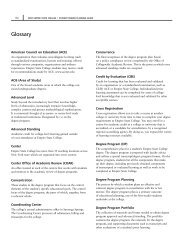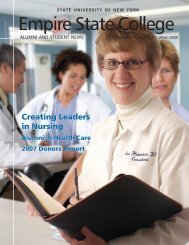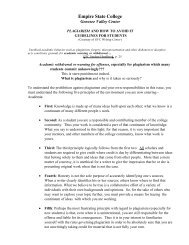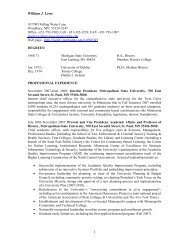All About Mentoring Spring 2011 - SUNY Empire State College
All About Mentoring Spring 2011 - SUNY Empire State College
All About Mentoring Spring 2011 - SUNY Empire State College
You also want an ePaper? Increase the reach of your titles
YUMPU automatically turns print PDFs into web optimized ePapers that Google loves.
21<br />
Changing Ways of Knowing<br />
for Transitioning Women<br />
Jo Jorgenson, Rio Salado <strong>College</strong> (Tempe, Ariz.)<br />
Schuante, a soft-spoken 47-year-old African<br />
American woman with five children, spent<br />
over 20 years in and out of prison, yet she<br />
emanates a profound state of well-being in<br />
her life now. After serving her last sentence,<br />
she returned to the community almost<br />
four years ago and secured employment<br />
in a field for which she was trained<br />
while incarcerated. Schuante continues<br />
to be successful in her work today. When<br />
asked about turning points in her life, she<br />
remarked, “To be honest, it only boils down<br />
to one thing for me: it is education.”<br />
Reflection<br />
When I first encountered her among a<br />
group of learners in a construction program<br />
that taught carpentry and electrical skills,<br />
Schuante was nearing release from a<br />
minimum security facility and finishing her<br />
workforce development training as a college<br />
student in prison. At Rio Salado <strong>College</strong> in<br />
Tempe, Ariz., incarcerated students enroll<br />
in certificate and associate degree programs<br />
while still in prison. Although the array of<br />
educational offerings has fluctuated over the<br />
last 25 years along with the state budgets<br />
and the political climate, the Department of<br />
Corrections has maintained contracts with<br />
the local community colleges throughout<br />
Arizona to provide opportunities for<br />
inmates to advance their education and<br />
learn skills that will improve their chances<br />
of employment. During one of these<br />
peaks in the department’s commitment to<br />
education for inmates, Rio was able to<br />
expand experiential learning for minimum<br />
security women by training them at actual<br />
construction sites in the community.<br />
The students, working alongside their<br />
instructor, applied theory to practice by<br />
building Habitat for Humanity homes and<br />
remodeling businesses and educational work<br />
spaces for government and industry.<br />
As I observed Schuante in this environment<br />
in my role as an administrator of<br />
instructional programs, I was struck by<br />
the contrast of her quiet, shy demeanor<br />
and the strength of her voice as she shared<br />
her learning experiences and knowledge<br />
with the newer students. She mentored and<br />
tutored, easily conveying her love for the<br />
electrical trade and her hope and dream to<br />
be a part of that industry after her release.<br />
It wasn’t until more than a year later that<br />
I chanced upon her again as one of 11<br />
interviewees whom I selected by criterion<br />
and snowball sampling strategies to be part<br />
of a phenomenological study. My purpose<br />
was to explore women’s perceptions of their<br />
post-secondary educational experiences<br />
during incarceration and the influence of<br />
that involvement in their lives post-release.<br />
The study was completed in partial<br />
fulfillment of the requirements for a degree<br />
of Doctor of Philosophy in Education,<br />
but I have been acutely interested in the<br />
relationship of education for incarcerated<br />
men and women to successful community<br />
re-entry for over 30 years. For much of<br />
that time, I have placed special focus on<br />
positively impacting the lives of women who<br />
have been serving sentences of probation,<br />
imprisonment, or parole for criminal<br />
activity. My exposure to their stories of<br />
economic and social marginalization as<br />
women struggling to survive in a world<br />
dominated by male principle has deeply<br />
moved me to concentrate my energies on<br />
creating enhanced and equal educational<br />
opportunities for this population. In my<br />
current position as dean of instruction<br />
and community development, my level of<br />
involvement is one that is more closely<br />
aligned with policy change, and less<br />
connected with individuals. Nevertheless,<br />
my passion for providing quality-driven<br />
post-secondary educational opportunities<br />
to incarcerated adults and juveniles is a<br />
constant. With regard to incarceration and<br />
reintegration, we have egregious social<br />
issues that need serious attention and<br />
contemporary, innovative solutions.<br />
Jo Jorgenson<br />
Relevance<br />
In the United <strong>State</strong>s, more than 2.3 million<br />
adult men and women are incarcerated in<br />
penal systems nationwide. More than one<br />
out of every 100 adults is behind bars; this<br />
country has the largest number of people<br />
under confinement in the world (Pew<br />
Center on the <strong>State</strong>s, 2008). The cost of<br />
educating a prisoner is less than the cost of<br />
incarcerating that prisoner (Erisman and<br />
Contardo, 2005), yet the value of education<br />
in the reduction of recidivism continues to<br />
be debated. Additionally, the burgeoning<br />
cost of incarceration and current economic<br />
shortfalls have led to programmatic cuts that<br />
inevitably affect educational funding.<br />
I was intrigued by the approach Owen<br />
(1998) offered for viewing the increased<br />
criminality of women. Building on the<br />
work of previous research, she posited that<br />
women’s criminal behavior is reflective of<br />
their attempts to survive under conditions<br />
that they did not create. They have<br />
been economically marginalized to the<br />
extent that they are not able to cope in a<br />
conventional society that still places great<br />
value on traditional roles such as those of<br />
suny empire state college • all about mentoring • issue 39 • spring <strong>2011</strong>


